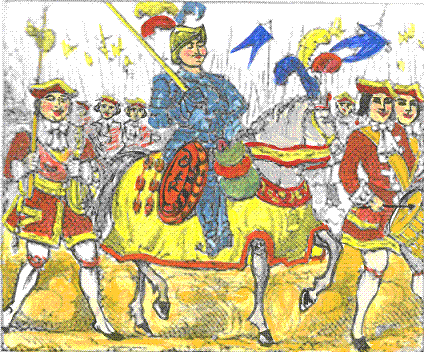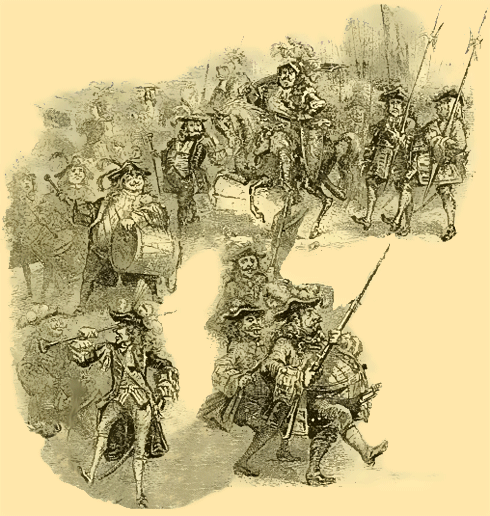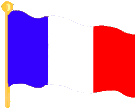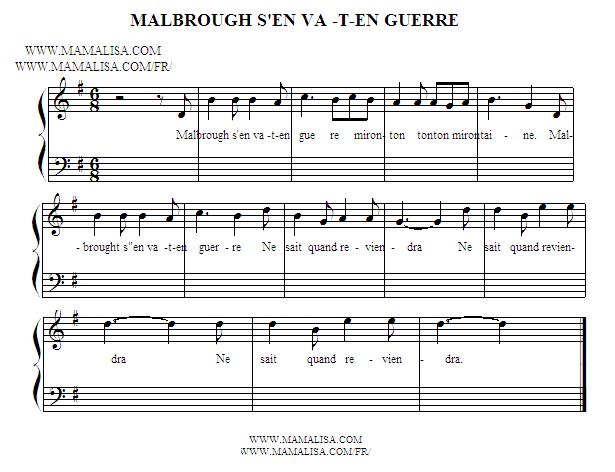Malbrough s'en va-t-en guerre
Malbrough is the French name for the Duke of Marlborough. The Duke of Marlborough was John Churchill, an English general who fought against France under King Louis XIV. An interesting side note is that John Churchill was Winston Churchill's ancestor.

Malbrough s'en va-t-en guerre
Marlborough Is Going to War
Chanson enfantine
Children's Song
(French)
(English)
Malbrough s'en va-t-en guerre,
Mironton ton ton mirontaine,
Malbrough s'en va-t-en guerre,
Ne sait quand reviendra,
Ne sait quand reviendra,
Ne sait quand reviendra.
Il reviendra à Pâques,
Mironton ton ton mirontaine,
Il reviendra à Pâques,
Ou à la Trinité,
Ou à la Trinité,
Ou à la Trinité.
La Trinité se passe,
Mironton ton ton mirontaine,
La Trinité se passe,
Malbrough ne revient pas,
Malbrough ne revient pas,
Malbrough ne revient pas.
Madame à sa tour monte,
Mironton ton ton mirontaine,
Madame à sa tour monte,
Si haut qu'elle peut monter,
Si haut qu'elle peut monter,
Si haut qu'elle peut monter.
Elle voit venir un page,
Mironton ton ton mirontaine,
Elle voit venir un page,
Tout de noir habillé,
Tout de noir habillé,
Tout de noir habillé.
Ô page ô mon beau page,
Mironton ton ton mirontaine,
Ô page ô mon beau page,
Quell's nouvell's apportez ?
Quell's nouvell's apportez ?
Quell's nouvell's apportez ?
Aux nouvelles que j'apporte,
Mironton ton ton mirontaine,
Aux nouvelles que j'apporte,
Vos beaux yeux vont pleurer,
Vos beaux yeux vont pleurer,
Vos beaux yeux vont pleurer.
Monsieur Malbrough est mort,
Mironton ton ton mirontaine,
Monsieur Malbrough est mort,
Et mort et enterré,
Et mort et enterré,
Et mort et enterré.
J' l'ai vu porté en terre,
Mironton ton ton mirontaine,
J' l'ai vu porté en terre,
Par quatre-z-officiers,
Par quatre-z-officiers,
Par quatre-z-officiers.
L'un portait sa cuirasse,
Mironton ton ton mirontaine,
L'un portait sa cuirasse,
L'autre son bouclier,
L'autre son bouclier,
L'autre son bouclier.
L' troisième portait son sabre,
Mironton ton ton mirontaine,
L' troisième portait son sabre,
L' quatrième ne portait rien,
L' quatrième ne portait rien,
L' quatrième ne portait rien.
**************
À l'entour de sa tombe,
Mironton ton ton mirontaine,
À l'entour de sa tombe,
Romarin l'on planta,
Romarin l'on planta,
Romarin l'on planta.
Sur la plus haute branche,
Mironton ton ton mirontaine,
Sur la plus haute branche,
Le rossignol chanta,
Le rossignol chanta,
Le rossignol chanta.
On vit voler son âme,
Mironton ton ton mirontaine,
On vit voler son âme,
À travers les lauriers,
À travers les lauriers,
À travers les lauriers.
Chacun mit ventre à terre,
Mironton ton ton mirontaine,
Chacun mit ventre à terre,
Et puis se releva,
Et puis se releva,
Et puis se releva,.
Pour chanter les victoires,
Mironton ton ton mirontaine,
Pour chanter les victoires,
Que Malbrough remporta,
Que Malbrough remporta,
Que Malbrough remporta.
La cérémonie faite,
Mironton ton ton mirontaine,
La cérémonie faite,
Chacun s'en fut coucher,
Chacun s'en fut coucher,
Chacun s'en fut coucher.
Les uns avec leurs femmes,
Mironton ton ton mirontaine,
Les uns avec leurs femmes,
Et les autres tout seuls,
Et les autres tout seuls,
Et les autres tout seuls.
Ce n'est pas qu'il en manque,
Mironton ton ton mirontaine,
Ce n'est pas qu'il en manque,
Car j'en connais beaucoup,
Car j'en connais beaucoup,
Car j'en connais beaucoup.
Des brunes et puis des blondes,
Mironton ton ton mirontaine,
Des brunes et puis des blondes,
Et des châtaignes aussi,
Et des châtaignes aussi,
Et des châtaignes aussi.
J' n'en dis pas davantage,
Mironton ton ton mirontaine,
J' n'en dis pas davantage,
Car en voilà-z-assez,
Car en voilà-z-assez,
Car en voilà-z-assez.
Marlborough is going to war,
Mironton ton ton mirontaine,
Marlborough is going to war,
Doesn't know when he'll come back,
Doesn't know when he'll come back,
Doesn't know when he'll come back.
He'll come back for Easter,
Mironton ton ton mirontaine,
He'll come back for Easter,
Or for Trinity Sunday,
Or for Trinity Sunday,
Or for Trinity Sunday.
Trinity Sunday is over,
Mironton ton ton mirontaine,
Trinity Sunday is over,
Marlborough isn't back,
Marlborough isn't back,
Marlborough isn't back.
Her Ladyship goes up into her tower,
Mironton ton ton mirontaine,
Her Ladyship goes up into her tower,
As high up as she can,
As high up as she can,
As high up as she can.
She sees a page coming,
Mironton ton ton mirontaine,
She sees a page coming,
Dressed all in black,
Dressed all in black,
Dressed all in black.
O page, O my nice page,
Mironton ton ton mirontaine,
O page, O my nice page,
What news do you bring?
What news do you bring?
What news do you bring?
When hearing the news I bring,
Mironton ton ton mirontaine,
When hearing the news I bring,
Your beautiful eyes will cry,
Your beautiful eyes will cry,
Your beautiful eyes will cry,.
Lord Marlborough is dead,
Mironton ton ton mirontaine,
Lord Marlborough is dead,
And dead and buried,
And dead and buried,
And dead and buried.
I saw him buried,
Mironton ton ton mirontaine,
I saw him buried,
By four officers,
By four officers,
By four officers.
One was carrying his breastplate,
Mironton ton ton mirontaine,
One was carrying his breastplate,
The other his shield,
The other his shield,
The other his shield.
The third was carrying his saber,
Mironton ton ton mirontaine,
The third was carrying his saber,
The fourth was carrying nothing,
The fourth was carrying nothing,
The fourth was carrying nothing.
**********
Around his grave,
Mironton ton ton mirontaine,
Around his grave,
They planted a rosemary tree,
They planted a rosemary tree,
They planted a rosemary tree.
On its highest branch,
Mironton ton ton mirontaine,
On its highest branch,
The nightingale sang,
The nightingale sang,
The nightingale sang.
His soul was seen flying,
Mironton ton ton mirontaine,
His soul was seen flying,
Through the laurels,
Through the laurels,
Through the laurels.
Everyone lay down upon the earth,
Mironton ton ton mirontaine,
Everyone lay down upon the earth,
And then got up again,
And then got up again,
And then got up again.
To sing of the victories,
Mironton ton ton mirontaine,
To sing of the victories,
That Marlborough won,
That Marlborough won,
That Marlborough won.
The ceremony done,
Mironton ton ton mirontaine,
The ceremony done,
Everyone went to bed,
Everyone went to bed,
Everyone went to bed.
Some with their wives,
Mironton ton ton mirontaine,
Some with their wives,
And others all alone,
And others all alone,
And others all alone.
It's not because there are only a few,
Mironton ton ton mirontaine
It's not because there are only a few,
Because I know there's a lot,
Because I know there's a lot,
Because I know there's a lot.
Dark-haired ones and blondes,
Mironton ton ton mirontaine,
Dark-haired ones and blondes,
And auburns too,
And auburns too,
And auburns too.
I'll say no more about it,
Mironton ton ton mirontaine,
I'll say no more about it,
For that's quite enough,
For that's quite enough,
For that's quite enough.
Notes
French people typically finish the song at the spot in the lyrics above where you see this symbol *********.
"The Duke of Marlborough didn't actually die in the battle of Malplaquet in 1709 as the song suggests." -Monique Palomares

Comments
Monique wrote: "Looking for some deeper information about the song, I came across the book "Notes pour l'histoire de la chanson" by V. Lespy (Librairie de J.B. Dumoulin, Paris, 1861). The author Lespy starts the book with an anecdote about this song, that it has an Arabic origin –both the lyrics and the music. The Arabic version was about the feats of one Mambrou. It is believed that the soldiers of James I of Aragon and Louis IX of France (Saint Louis) probably brought the song back from the crusades in the 13th century. It's the legend of Mambrou that French King Louis 16th's son's nurse sang to him. Mambrou was changed to Malbrough at the end of the 18th century. If you know some French you can read the whole story at the link above."
The Spanish version is called "Mambrú se fue a la guerra". You can click the link to read it.
Souad Lamine wrote: "In Tunisia we sing, 'Mabrouk s'en va t'en guerre'."
The tune to "For He's a Jolly Good Fellow" comes from this song.

Thanks and Acknowledgements
Many thanks to Monique Palomares for contributing this song and creating the midi music! Translated by Lisa Yannucci and Monique Palomares.
The 1st illustration is from Imagerie d'Épinal Pellerin #442 (from the end of 19th century), edited and colorized by Monique Palomares.
The 2nd illustration is from Chansons et rondes enfantines (1871) with some graphical editing by Lisa Yannucci.
Merci beaucoup!

























